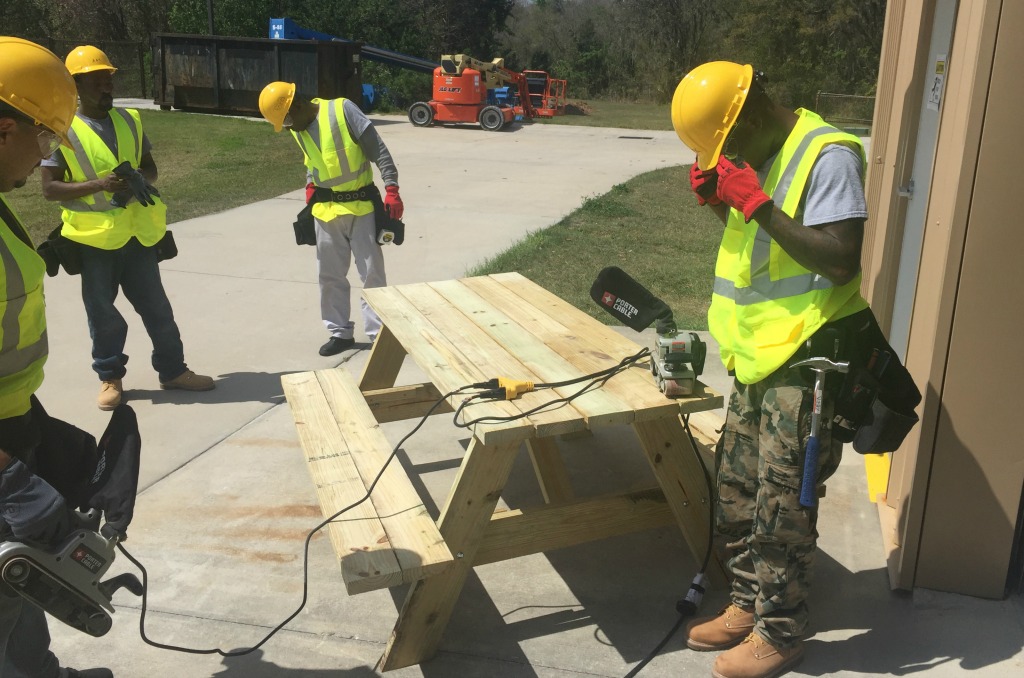Before Aaron Person signed up for a class in basic construction, he had little experience in the field – except for chores he’d helped his dad with at home.
“I’d done mostly patchwork around the house, mixing concrete, home chores. I’d patch up a fence or my dad and I would do a little bit of roofing,” says Aaron, who’s 23.
But when he learned about Valencia College’s new class teaching basic construction skills – one that had been created in partnership with some of the biggest construction firms in Central Florida – Aaron was eager to sign up.
Although he’d toyed with the idea of training in nursing or culinary arts, he thought construction sounded more like his thing. “I’m really hands-on,” says Aaron.
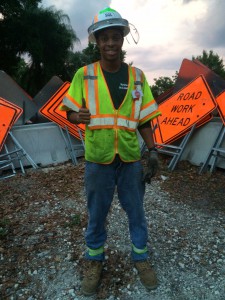
Aaron’s five-week class paid off quickly. Aaron was one of the first graduates of Valencia’s basic construction program – and landed a job immediately upon graduation. Today he’s working on a lane-closure crew with Skanska-Granite-Lane, the construction company behind the I-4 Ultimate project.
“It’s a really great company,” says Aaron, who started working a day shift with a pipe crew, but after several weeks was shifted to a nighttime team that closes lanes for construction. “Now I help set up the closures, lay down the cones, learn where to put the arrow boards, and that kind of thing. One of the things you learn is that there’s an actual formula that goes into how you set up a lane closure. But above all, they stress safety.”
Aaron was one of the first students in the new program, which kicked off in November 2015 at Valencia’s Osceola Campus. Together, Aaron and his classmates – including veterans and women – learned the skills needed on today’s construction sites.
Valencia launched the short-term training program in 2015, after local construction companies expressed concern about finding enough workers. The problem, said local building officials, is acute. There’s a growing need for construction workers to help build the roads, infrastructure and building projects that are all starting up, now that the economy is revving up again.
“There are all these construction jobs out there and a shortage of skilled workers,” says Javier Rojas, program manager for Valencia’s new construction training program. “So we decided we wanted to create a program that would help with that workforce development. What better venue than Valencia College? We already work with the community.”
And the shortage of construction workers is being felt nationwide. A 2015 survey by the Associated General Contractors of America revealed that nearly 80 percent of construction businesses are having a hard time finding qualified skilled labor. The labor shortage is now in full bloom, with repercussions being felt throughout the nation.
According to the U.S. Bureau of Labor Statistics and National Association of Home Builders (NAHB), there are currently 143,000 vacant construction positions nationwide. A recent survey by the NAHB revealed that 69 percent of its members were experiencing delays in completing projects on time due to a shortage of qualified workers, while other jobs were lost altogether.
For many people – including those who dropped out of high school, people with blemishes in their background or those who have a hard time landing a job – the construction industry offers a career ladder.
“Not a lot of people are aware of the potential career growth in the construction industry. We typically pay higher than most entry-level positions and offer a career path where you can earn a significant amount of money and can travel – once you learn a certain skillset,” said Bryan Grassing, human resources director at Skanska USA’s Tampa offices.
And today, construction firms are eager to find qualified women and minority job candidates.
To prepare students in Valencia’s basic construction program with skills they’ll need on the job site, Valencia is using a curriculum developed by the National Center for Construction Education and Research. The nationally recognized certificate takes 72.5 hours to complete, but Valencia’s program requires 200 classroom hours – which also includes basic computer skills, resume writing and interview skills. Valencia has also partnered with SunTrust to teach the students financial literacy – so they learn about budgeting and how to re-establish credit.
But what students like is the hands-on nature of the construction classes.
“Every day was something new; it was always so interesting,” says Aaron. And though he didn’t have any prior construction experience, he was never embarrassed. Thanks to the hands-on style of the class, everyone could learn at their own pace.
“We all had fun in there,” says Aaron. “Going over the books, using the tools, it was a really practical class. It was just like we were out in the work zone.”
Instructors say that translating the book to the real world is critical for teaching construction skills.
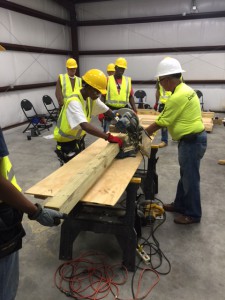
“We realize that some of our students may not have graduated from high school. Or they went to high school but didn’t go to college – for them, the traditional classroom approach is not their style of learning. So we do a lot of practical application. By that I mean, we actually build things,” says Rojas. “We look at the book and then go into the construction lab, show them the tools and they do several projects through the course of this class.”
At the Osceola Campus, students in one construction class built models of roofs, which the Kissimmee Fire Department then used to train firefighters – letting firefighters practice cutting holes in the roof models to vent smoke. Another class built K-9 dog boxes for the Orange County Sheriff’s Department K-9 unit to use during training exercises. And one class built a low-ropes course apparatus for the Osceola County Corrections Department’s youth camp programs.
In the construction course – which is held daily from 7:30 a.m. to 4 p.m. – instructors emphasize punctuality. “Students are expected to be there before 7:30, not walking in at 7:31 or 7:35, because at work you’re not allowed to be late,” says Rojas.
Students are also issued their own personal protection equipment – hard hats, gloves, safety glasses, steel-toed boots and a tool belt with a quality, commercial-grade hammer, tape measure, level, speed square and screwdrivers.
“That way, when they graduate, they’re prepared to walk onto a construction site,” adds Rojas.
During the course, students also visit construction sites to see the skills and equipment in action. “There, they see the real-world application of what they’re learning in class. They’re learning why we’re constantly talking about safety; they see that on the site. They see why it’s important to wear the safety gear,” says Rojas. “Also, it gives our partners a chance to meet our students – who may be their future employees.”
Partnering with heavyweights in the construction world
One of the companies behind Valencia’s program is the SGL Group, the construction partnership that is building the I-4 Ultimate Project, a $2.3 billion, six-year overhaul of 21 miles of Interstate 4 through Orange and Seminole counties. Skanska has donated $25,000 of equipment to the Valencia program, to help teach students with the kind of tools they’ll be using on job sites.
In addition to the SGL Group, Valencia has also partnered with other construction heavyweights in Central Florida, including FinFrock, JEL and Jr. Davis Company.
“What we’re trying to do is establish relationships so we can get our students established with good careers,” says Rojas. Because the students have earned a national certification and a safety certificate, Valencia graduates are earning at least $12 an hour immediately upon hiring.
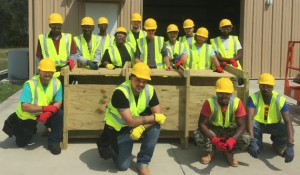
And with almost $10 billion of construction planned in the next five years, Central Florida companies are desperate for workers. “Florida being one of the huge growth states, we need workers. Not just the I-4 project, but for years of work,” says Grassing. “And when I learned how they were going to be vetting candidates for the Valencia program, that really struck home with me. The instructors are giving them the basic knowledge; that’s all we’re asking for. We can teach them the specifics.”
Employers are also pleased with the college’s strict attendance policies. “Attendance is a huge factor,” says Grassing. “If they’re showing up every day for your class, they’re one step ahead of people who are walking in off the street. It shows they’re serious and dedicated to the craft.”
At Jr. Davis Construction, which has a three-year backlog of road projects throughout Central Florida, hiring manager Jennifer Montgomery has three graduates from Valencia’s construction program – and is looking for more.
Like most construction companies in the area, Jr. Davis managers watched skilled tradespeople leave Florida for other markets during the Great Recession. “We saw them moving to North and South Dakota, Texas and Louisiana – places where there was still work available,” said Montgomery. “They had families to support. They couldn’t wait for the work to return.”
With those skilled laborers gone, Jr. Davis and other firms are trying to build a skilled workforce again. And that’s where Valencia’s program fits in. “The Valencia program preps them to learn what’s expected of them,” she said.
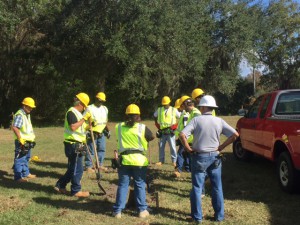
After they’re hired, the construction workers can learn more skills on the job – and increase their hourly pay.
“What we do is, we’ll hire the Valencia students as a skilled laborer,” says Grassing. “Once they’re on a project, we’ll see that they’re gravitating toward an area — welding, carpentry, concrete. Once we see that they’re committed, we’ll push them to on-the-job training and they’ll continue to further their careers.”
Although Aaron Person is still learning the ropes of the lane-closure crew, he’s interested in learning how to operate heavy construction equipment. But for now, he’s happy he took the short-term training program at Valencia. “My instructors were absolutely amazing,” says Aaron. “They did a lot for me and I really appreciate it.”
Taking the show on the road
In addition to the classes being taught at Valencia’s Osceola Campus in Kissimmee, the college also has two mobile units that take the course tools and materials into the community. Recently, Valencia instructors taught a class at Apopka’s John Bridges Community Center.
“We’re able to do the mobile units because we want to be a part of the community and get to where the students are,” said Rojas. Students who don’t own cars might find it impossible to get to a construction course in Kissimmee, but the mobile units allow the college to take the class to communities throughout Central Florida.
What’s next for the program? Valencia officials are planning to create a series of short courses on advanced construction skills – allowing students who’ve already mastered basic construction to learn skills that would enable them to earn more money. Next up are certificates in concrete finishing, supervisor/foreman, and heavy equipment operation.
“We are forging ahead on this,” says Rojas. “What we want students to realize is this is not job-training. We’re talking about getting a career. They’re investing time and money in getting an education for a solid career.”
To learn more about Valencia’s basic construction classes, please visit https://valenciacollege.edu/academics/accelerated-skills-training/construction-and-maintenance.php
